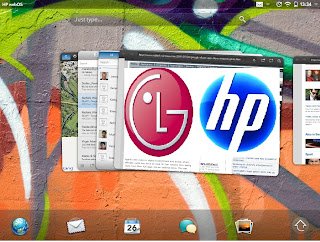LG and HP announced yesterday that they have partnered with LG to take over the development and production of all things webOS related, with a few caveats. HP will keep the cloud end of the deal (App Catalog, Profile information, etc.) while LG will continue on with the operating system, both in proprietary form and OpenwebOS. All the Palm patents will stay inside the HP portfolio, but have been licensed to LG for an undisclosed amount.
LG has publicly said that this bold, new move is to replace their aging smart TV platform with the nimble web-based platform we have all come to love. CEO and President, Scott Ahn, has also stated that this is just a start and that LG will explore implementing webOS on various smart devices. Now, with a corporation the size of LG, smart devices could be mean many, many things. So, my question to LG is simply this: Why would you not make a webOS smartphone and tablet?
The market is currently screaming for something to rival Android and iOS. I know BlackBerry and Windows are both making big swings at it, but neither has knocked it out of the park yet. Android is evolving into a two man race between its “creators”, Google, and its “champion”, Samsung. Everyone else is just looking for scraps inside the profit margin. Apple is Apple.
Android still kinda sucks on a tablet. There, I said it. The UI just doesn’t seem to flow on a screen meant to be in landscape or portrait. The larger the screen, the poorer the experience. You know what works amazingly well on a tablet? webOS. If you don’t believe me, grab a TouchPad from one of your new employees and enjoy the ride. Yeah, the hardware is bland, and the apps never really made it there, but the core OS is still the best I’ve personally experienced on the tablet form factor.
Phones are harder, I know, but I still think you can succeed there as well. People still want to see a webOS phone running on Nexus 4 quality hardware. Hell, we would settle for the WindsorNot we only saw after HP crapped on us. I have never seen another OS that people were absolutely dying to get there hands on that companies are afraid to take the leap. Just do it LG.
You have stated that you will not launch your first TV running webOS until CES of 2014. I know that revamping your whole TV system will take time and resources, but couldn’t you reserve a small team to make a smart phone and tablet happen in the mean time? Give the faithful a chance to prove the OS is worth the effort.
Take the leap. Build us 200,000 webOS Nexus phones and the same in a 7 inch tablet at a reasonable price. Set the phone unlocked for $299 and the tablet at $199-250. See if they don't sell out in a week and make you scurry for more manufacturing.
LG, you have apparently seen enough of webOS to want to invest in it. All I'm asking is you reward all those that championed the software while HP drove it in the ground. This community is down, but they have not left. We lost any faith in HP to deliver, but not webOS.
We still believe, and we still want it. So, surprise us.
















